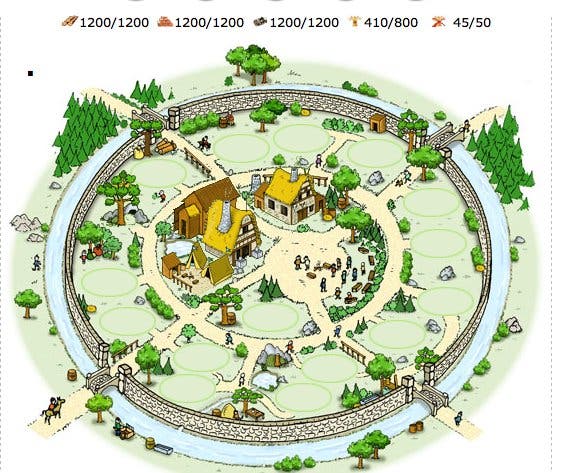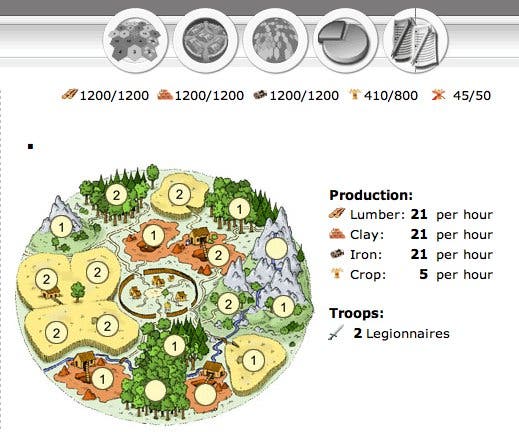Travian
It's got a lot of Gaul.
Eventually, however, the pace of Travian becomes clear. Slowly, towns start to come together as the game's options emerge: create crannies for protecting resources from raids, embassies for forming alliances, a rally point and barracks to construct your own army before thinking about moving outwards.
After a few days of this, you'll start to notice the way the game insinuates itself into your life. This is perfect for playing while waiting for an email, managing your Flickr account, calculating your net worth, or even conducting a low maintenance affair. The pleasure of construction leading into the promise of empire-building is so slickly handled that the timescale has little detrimental effect. And once Travian's got going, each log-in proves opportunity for a few tweaks and stratagems, as your cities improve, your population grows, your resources replenish more quickly and your build times fall.
Factor in the incidental benefits, too: after three days of playing Travian, my house had never been cleaner. I'd rearranged bookcases, located that bit of the Dyson that allows you to sort out the top ledges of doorways, and even found time to read Isaac Asimov's distressingly granular two-volume autobiography (you might want to skip that one). Crucially, none of this activity meant that I'd neglected Travian in the slightest. To the contrary, the handful of decisions I was making every hour meant my empire was quietly thriving, and I was planning on expansion. Six months of this game and you should fully expect to be able to speak Italian, recite the periodic table (also in Italian), and master the piano-accordion - a far cry from the rotten marriages and stale birthday cake left behind in the wake of World of Warcraft.
Alarmingly, none of this is by way of criticism. There's something refreshing about a game that forces you to its pace in an age when most titles can't wait to shower you with trinkets and mini-games just for prodding a few buttons. Travian is an activity that can fit snugly into the fabric of your life. In fact, it only really works when you half-forget it. Like one of those optical illusions where the picture disappears whenever you try to focus on it, playing Travian for hours at a time, even when you're being raided, would be counter-productive. Instead, you log-in, build an iron mine, attack a neighbour, and back out again. You know, a bit like real life.

All of this suggests the game is peaceful, but that couldn't be further from the truth. For their first few days, Travian players exist under beginner's protection, free from attack from enemies. Once this period is past, assaults will likely come thick and fast, either to destroy and conquer or farm resources.
Travian tries to protect starters by clumping new players together, but in a game where the object is to expand your territory, warfare is the easiest means of doing so, with new players bearing the brunt of the attacks. It's a legitimate strategy, then, but it can still feel like griefing, and the game's own patchy documentation is slow to brief on the difference between offensive and defensive troops or how to tell a raid (which will leave survivors on both sides) from a full-on attack.
Watching enemy catapults reduce the hard-won levels of your buildings, while your outward-lying cities are captured, can be tough to bear when you don't understand how exactly to fight back or whether you should be upgrading the weapons of your offensive troops or the armour of your defensive. Travian's warfare is deep and customisable, with spies, loyalty, and the speed of your reinforcements all coming into play, but this is only truly revealed over the course of many weeks. The best solution for the early stages is to form an alliance with other, more powerful players until you can fight back on your own.

If a lack of hand-holding can make Travian's surprising levels of aggression bewildering, the paid content is more troubling. Although the game is free, players can buy perks. "Plus" simply offers better management tools, such as a larger map and the ability to cue up builds. More controversially, "Gold" buys you production bonuses, allowing you to harvest resources quicker and get better deals from merchants. Gold has seen many players leaving the game, and, while that might be an extreme reaction, its ethos seems at odds with the rest of the experience.
Ultimately, then, Travian is a risk. In the heat of battle, it can be a lot like grain-by-graining an elaborate sandcastle into existence only to have the big boys step on it. But the quiet charm, coupled with its hard tactical heart and the strange dexterity with which it can coil itself into the roots of your everyday life, means you're unlikely to find a game that's both wilful and accommodating in quite the same way. Travian may not be perfect, but chances are good that you'll find it's still a risk worth taking.
